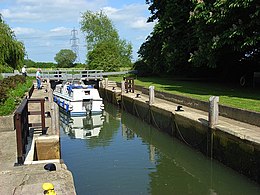| Revision as of 08:27, 4 April 2015 editMotacilla (talk | contribs)Autopatrolled, Extended confirmed users, Pending changes reviewers63,107 edits Added photo of lock & link to Grafton, Oxfordshire. Formatted citation.← Previous edit | Latest revision as of 21:20, 6 February 2022 edit undoQwerfjkl (bot) (talk | contribs)Bots, Mass message senders4,012,240 editsm Capitalising short description "lock on the River Thames in Oxfordshire, England" per WP:SDFORMAT (via Bandersnatch) | ||
| (5 intermediate revisions by 5 users not shown) | |||
| Line 1: | Line 1: | ||
| {{Short description|Lock on the River Thames in Oxfordshire, England}} | |||
| {{Use dmy dates|date=April 2017}} | |||
| {{Use British English|date=April 2017}} | |||
| {{Infobox Waterlock | {{Infobox Waterlock | ||
| |lock_name = Grafton Lock | |lock_name = Grafton Lock | ||
| Line 37: | Line 40: | ||
| There was previously a weir with a ] on the site known variously as Day's, East, New Lock or Lower Hart's. The name Lower Hart's was to avoid confusion with another Hart's Weir upstream which was eventually replaced by ] in 1936. | There was previously a weir with a ] on the site known variously as Day's, East, New Lock or Lower Hart's. The name Lower Hart's was to avoid confusion with another Hart's Weir upstream which was eventually replaced by ] in 1936. | ||
| The Thames Conservancy removed the weir in 1869 |
The Thames Conservancy removed the weir in 1869. The first suggestion for a permanent pound lock was made in 1892, four years before it opened.{{sfn|Thacker|1968|p=50}} | ||
| ==Access to the lock== | ==Access to the lock== | ||
| Line 65: | Line 68: | ||
| ==External links== | ==External links== | ||
| * at thames.me.uk | * at thames.me.uk | ||
| * at geograph.org.uk | * at geograph.org.uk | ||
| {{coord|51.69090|-1.60935|type:landmark_region:GB_source:enwiki-osgb36(SU271992)|display=title}} | {{coord|51.69090|-1.60935|type:landmark_region:GB_source:enwiki-osgb36(SU271992)|display=title}} | ||
| Line 71: | Line 74: | ||
| ] | ] | ||
| {{oxfordshire-geo-stub}} | {{oxfordshire-geo-stub}} | ||
| ] | ] | ||
Latest revision as of 21:20, 6 February 2022
Lock on the River Thames in Oxfordshire, England
| Grafton Lock | |
|---|---|
 Grafton Lock Grafton Lock | |
| Waterway | River Thames |
| County | Oxfordshire |
| Maintained by | Environment Agency |
| Operation | Manual |
| First built | 1896 |
| Length | 34.59 m (113 ft 6 in) |
| Width | 4.59 m (15 ft 1 in) |
| Fall | 1.11 m (3 ft 8 in) |
| Above sea level | 223' |
| Distance to Teddington Lock | 118 miles |
| Grafton Lock | |||||||||||||||||||||||||||||||||||||||||||||||||||||||||||||||||||||||||||||||||||||||||||||||||||||||||
|---|---|---|---|---|---|---|---|---|---|---|---|---|---|---|---|---|---|---|---|---|---|---|---|---|---|---|---|---|---|---|---|---|---|---|---|---|---|---|---|---|---|---|---|---|---|---|---|---|---|---|---|---|---|---|---|---|---|---|---|---|---|---|---|---|---|---|---|---|---|---|---|---|---|---|---|---|---|---|---|---|---|---|---|---|---|---|---|---|---|---|---|---|---|---|---|---|---|---|---|---|---|---|---|---|---|
| Legend | |||||||||||||||||||||||||||||||||||||||||||||||||||||||||||||||||||||||||||||||||||||||||||||||||||||||||
| |||||||||||||||||||||||||||||||||||||||||||||||||||||||||||||||||||||||||||||||||||||||||||||||||||||||||
Grafton Lock is a lock on the River Thames in Oxfordshire, England. It is on the northern bank between Kelmscott and Radcot, about 1 mile (1.6 km) south of the hamlet of Grafton. The lock was built by the Thames Conservancy in 1896.
The weir is on the other side of the lock island at the upstream end.
Grafton Lock Meadow at the lock is a Site of Special Scientific Interest.
History
There was previously a weir with a flash lock on the site known variously as Day's, East, New Lock or Lower Hart's. The name Lower Hart's was to avoid confusion with another Hart's Weir upstream which was eventually replaced by Eaton Footbridge in 1936.
The Thames Conservancy removed the weir in 1869. The first suggestion for a permanent pound lock was made in 1892, four years before it opened.
Access to the lock
The lock can be reached on foot along the river or by road on a turning off Langley Lane which connects to the A4095.
Reach above the lock
On the southern bank the river passes Eaton Hastings. On the north bank is Kelmscott and Kelmscott Manor, the country retreat of William Morris.
Further upstream the river is crossed by Eaton Footbridge There are moorings at this point reflecting the history of the site which had a weir and flash lock until 1936.
The Thames Path follows the northern bank to Buscot Lock.
See also
| Next lock upstream | River Thames | Next lock downstream |
| Buscot Lock 5.37 km (3.34 mi) |
Grafton Lock Grid reference: SU271992 |
Radcot Lock 2.98 km (1.85 mi) |
References
- ^ "Environment Agency Dimensions of locks on the River Thames". web page. Environmental Agency. 8 November 2012. Retrieved 17 November 2012. Dimensions given in metres
- Thacker 1968, p. 50.
- ^ "Environment Agency Distances between locks on the River Thames". web page. Environmental Agency. 8 November 2012. Retrieved 19 November 2012. Dimensions given in metres
Sources
- Thacker, Fred. S. (1968) . The Thames Highway. Vol. II: Locks and Weirs. Newton Abbott: David & Charles. pp. 13, 45, 49–52, 84. SBN 7153-4233-9.
External links
- Grafton Lock at thames.me.uk
- Picture of Grafton Lock at geograph.org.uk
51°41′27″N 1°36′34″W / 51.69090°N 1.60935°W / 51.69090; -1.60935
This Oxfordshire location article is a stub. You can help Misplaced Pages by expanding it. |